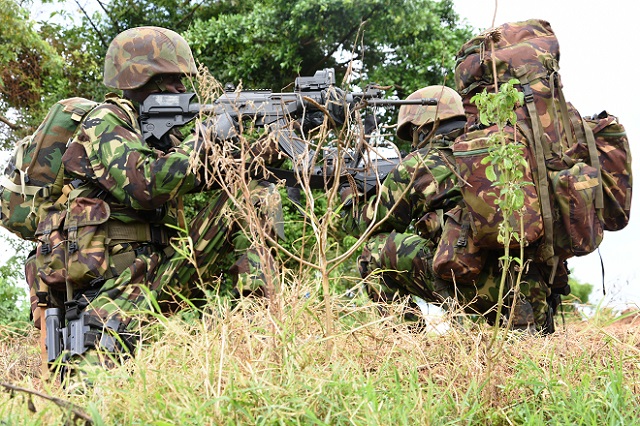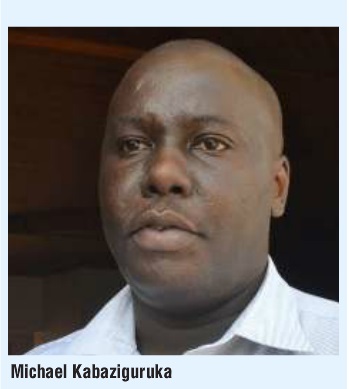
Dodgy intelligence, local interests, international backers
Monday June 6: Soldiers of the Special Forces Group which falls under President Yoweri Museveni’s son, Maj. Gen. Muhoozi, are on a mission near Kampala city in Kyengera town in Wakiso District. They are moving in four pick-up trucks. The target is suspected recruits of a forming clandestine rebel group allegedly operating in an incomplete storied building. Most are ex-soldiers and servicemen from Iraq. When the Special Forces arrive at the target, there is sound of gunfire. Four men are arrested. The soldiers drive off leaving a few anti-terrorism police and plain-clothed security to guard the cordoned off building.
Wednesday June 8: It is 5am. Michael Andrew Kabaziguruka, the new MP for Nakawa Division of Kampala city is at his house in Luzira. Police say he faces charges related to a “grave offence”. He is detained at the police and army Special Investigations Unit at Kireka, a Kampala city suburb. Wednesday

June 8: Dan Oola Odiya, the opposition Uganda Peoples Congress party deputy secretary for mobilization, is walking along Coronation Road in Gulu town. It is 8pm and dark. Police pounce on Oola. Next day it is announced that Oola is being held “on a very sensitive crime following high-level intelligence”.
Saturday June 11: Edward Abili, son of Col. Dan Opito Odwee Dan Opito, a garrison Commander Air Force in the Uganda army posts the following message on his Facebook page: “I don’t know what is happening in Uganda, it looks like arresting and detaining citizens has become the order of the day. I have just received disturbing news that the Ugandan government has arrested my father who happens to be Col. Dan Opito Odwee Dan Opito the garrison Commander Air Force. Where are we heading?”
Soon news of Col. Opito’s arrest spread on social media.
Sunday June 12: It is 8pm in Gulu. A group of armed people are driving a battered blue pickup truck. Soon they enter the compound of the regional police headquarters in Gulu. Gunfire erupts. When the fighting ends, one UPDF officer is dead and several lie injured. The attackers have vanished into the night, leaving the battered and now bullet-riddled truck behind. It is not clear what injuries or deaths – in any – the attackers suffered.
Is there a connection between these events, which happened in one week – from June 6 to Sunday June 12 – but in locations far away from each other?
Days after the events, it is suspected that about 40 people including Uganda army Col. Dan Opito Odwee, are believed to have been arrested and remain under detention over alleged “subversive activities”. Some of them are named in the earlier incidents.
But earlier, several UPDF officers had been arrested from Bombo Barracks and the air defence barracks in Nakasongola district. Among them, from Bombo, is one Capt. John Ojara, the head of Armoury.
Kayihura’s criminal gangs
Following the attack on Gulu police headquarters, the police and army are putting on a brave face.
Police chief Kale Kayihura told journalists in Kampala that the ferocious defense put up by the army and police forced the attackers to flee and drop six AK47s machine guns, one PK machine gun, over 200 rounds of ammunition, and bow and arrows. Kayihura estimated that the attackers were possibly about 12.
Since then a number of choice words have been used to describe the Gulu attackers. Criminal gang, thugs, and armed rebels, are some of the descriptions.
Explanations about the attack and the alleged coup attempt have been scarce. The few that have been offered are being treated by many commentators as far from credible.
The attack has also sparked a slew of stories of a different kind– both locally and internationally. “Uganda Tensions Rise as Presidential Challenger Tried for Treason”, said Voice of America on June 14.
Some like the Sudan Tribune focused directly on the attack. Its headline: “Uganda government clashes with armed group in Gulu”.
The `coup’ story had broken earlier even on the international scene as shown by the June 10 Daily Star story: “At least 30 held in Uganda over coup plot: army”. Same with the “Uganda Arrests Dozens of Military Leaders Accused of Plotting Coup” screamer in the New York Times of June 12.
The coup story describe a spate of arrests of politicians, low and high ranking army personnel, security operatives, and civilians over what the army is calling “subversive activities” and the media has christened “treason”. The attack on Gulu appears to have kindled a belief that the coup talk might not be empty talk.
Possibly because the most prominent arrest was that of Kabaziguruka, an MP of Uganda’s main opposition party; the Forum for Democratic Change (FDC), a connection is being made between the arrests, the coup attempt, and the former FDC presidential candidate Kizza Besigye who is on remand at the Luzira Miximum Security Prison on treason charges.
Another prominent name being mentioned in the coup attempt story is renegade Gen. David Sejusa, who broke ties with President Yoweri Museveni and announced that the President had a plot to both install his son, now Maj. Gen. Muhoozi Kainerugaba as his successor and eliminate anyone attempting to block that plot. Gen. Sejusa fled into exile in London where he continued to advocate for an armed rebellion to topple Museveni. But in an inexplicable twist, Sejusa returned to Uganda, dined with Museveni, was briefly jailed for engaging in politics while still a soldier, and remains a free man. He has neither been arrested nor questioned by the investigators over the latest alleged coup plot.
 The Independent Uganda: You get the Truth we Pay the Price
The Independent Uganda: You get the Truth we Pay the Price



